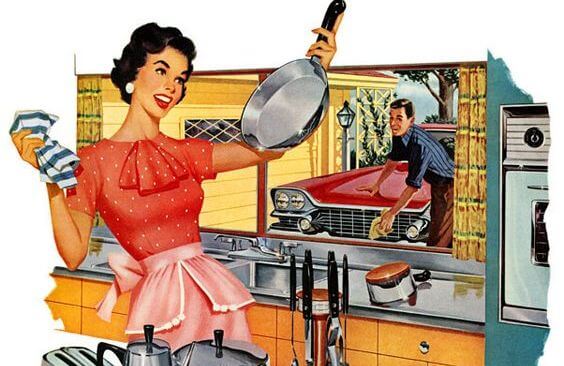My Partner Doesn’t “Help Me” at Home: We Collaborate

“My partner helps me do the housework.” We all keep hearing this phrase, to our despair, this worn-out expression where we find implications of a gender categorization that needs to be rethought. No one should help anyone in a household, because what should exist is a common responsibility, teamwork.
In our society, despite all our advances, from our changes in mentality and each little success obtained concerning gender equality, there are still the roots of the patriarchal model. We can still find the idea that the man puts bread on the table and the woman manages the household and the children.
“Both men and women should feel free to be strong… It is time that we all perceive gender on a spectrum not as two opposing sets of ideals. We have to stop defining each other by what we are not.”
– Emma Watson’s speech at the UN –
Nowadays, thinking that the responsibility of household chores and the upbringing of children is exclusively the responsibility of the women is rather old-fashioned, a vestige of a past that is no longer relevant, or at least shouldn’t be.
We have to keep in mind that each partner is a world, each house has its dynamics, and it is its own members who establish the division and the responsibilities based on their availability. Factors like their jobs doubtlessly determine these agreements that must be managed in an equal, agreed-upon, and respectful way.
We invite you to reflect on this with us.

Time have changed (a bit, anyway)
Times have changed; we are different now. We are braver, and have many more challenges than our grandmothers and grandfathers. At least, this is what we want to believe and we fight for it. However, there are still large bridges to cross. Matters like the salary gap or equal opportunities are factors that still have the gender stigma. Complex battles that women have to keep working on.
Nevertheless, concerning the responsibility of a household, the housework, and caring for children, there have been considerable advances in terms of equality. It is obvious that each person will have their own personal experience, that in every country, every city, and every household, there are specific realities that condition our opinions on this topic.
In fact, the agency Reuters published an interesting study a few years ago that had a provocative title: husbands create seven hours of extra housework a week. With this statement, they made it clear that inequality in terms of housework remains an obvious reality. However, this is very far from the data obtained in 1976 which stated that the difference was 26 hours a week.

While a few decades ago, women fully assumed the role of a housewife, nowadays they have crossed the border from the private sector to those public spheres that were previously inhabited exclusively by their husbands. Nevertheless, sharing the same spaces does not always mean equal opportunities or equal rights.
At times, many women take on the responsibility of both spheres. In addition to their professional life, they also have all the responsibility at home and for bringing up their children.
If it is indeed true that in terms of domestic chores, the man’s role is in many cases fulfilled and equal, the same does not happen when it comes to caring for a person’s dependents. These days, caring for the elderly or children with disabilities almost exclusively falls to the woman.
Household chores and our daily agreements
Household chores are not anyone’s inheritance; in fact, they are totally exchangeable. Ironing is not just a job for mom, nor is fixing the fridge a job reserved for dad. Maintaining a household, be this in economic terms or in doing household chores like caring for others or maintenance, is the job of all those who live under that roof, whatever sex they may be.
The curious part about all this is that at this stage in the game, we keep hearing people repeat the words “my husband helps me at home” or “I help my girlfriend wash the dishes.” Every task is sexualized in pink and blue.

Daily agreements and the equal division of things is what brings harmony to the domestic routine. The agreements should not be made simply out of equality or due to gender rules, but with logic and common sense.
If my partner works the whole day and I am unemployed or I have freely chosen to stay at home to raise my children, I cannot demand that they make me dinner and take care of the laundry. In the same way, caring for the children is also not just one person’s job. Mom is not obligated to be a “supermom.” A child is a responsibility for both of those who chose to have it, and what’s more, we have to serve as a model for them, showing them, for instance, that the kitchen is not anyone’s home turf.
That making the bed, taking care of our dog, and maintaining a household is not helping mom or dad; it is everyone’s responsibility.
“My partner helps me do the housework.” We all keep hearing this phrase, to our despair, this worn-out expression where we find implications of a gender categorization that needs to be rethought. No one should help anyone in a household, because what should exist is a common responsibility, teamwork.
In our society, despite all our advances, from our changes in mentality and each little success obtained concerning gender equality, there are still the roots of the patriarchal model. We can still find the idea that the man puts bread on the table and the woman manages the household and the children.
“Both men and women should feel free to be strong… It is time that we all perceive gender on a spectrum not as two opposing sets of ideals. We have to stop defining each other by what we are not.”
– Emma Watson’s speech at the UN –
Nowadays, thinking that the responsibility of household chores and the upbringing of children is exclusively the responsibility of the women is rather old-fashioned, a vestige of a past that is no longer relevant, or at least shouldn’t be.
We have to keep in mind that each partner is a world, each house has its dynamics, and it is its own members who establish the division and the responsibilities based on their availability. Factors like their jobs doubtlessly determine these agreements that must be managed in an equal, agreed-upon, and respectful way.
We invite you to reflect on this with us.

Time have changed (a bit, anyway)
Times have changed; we are different now. We are braver, and have many more challenges than our grandmothers and grandfathers. At least, this is what we want to believe and we fight for it. However, there are still large bridges to cross. Matters like the salary gap or equal opportunities are factors that still have the gender stigma. Complex battles that women have to keep working on.
Nevertheless, concerning the responsibility of a household, the housework, and caring for children, there have been considerable advances in terms of equality. It is obvious that each person will have their own personal experience, that in every country, every city, and every household, there are specific realities that condition our opinions on this topic.
In fact, the agency Reuters published an interesting study a few years ago that had a provocative title: husbands create seven hours of extra housework a week. With this statement, they made it clear that inequality in terms of housework remains an obvious reality. However, this is very far from the data obtained in 1976 which stated that the difference was 26 hours a week.

While a few decades ago, women fully assumed the role of a housewife, nowadays they have crossed the border from the private sector to those public spheres that were previously inhabited exclusively by their husbands. Nevertheless, sharing the same spaces does not always mean equal opportunities or equal rights.
At times, many women take on the responsibility of both spheres. In addition to their professional life, they also have all the responsibility at home and for bringing up their children.
If it is indeed true that in terms of domestic chores, the man’s role is in many cases fulfilled and equal, the same does not happen when it comes to caring for a person’s dependents. These days, caring for the elderly or children with disabilities almost exclusively falls to the woman.
Household chores and our daily agreements
Household chores are not anyone’s inheritance; in fact, they are totally exchangeable. Ironing is not just a job for mom, nor is fixing the fridge a job reserved for dad. Maintaining a household, be this in economic terms or in doing household chores like caring for others or maintenance, is the job of all those who live under that roof, whatever sex they may be.
The curious part about all this is that at this stage in the game, we keep hearing people repeat the words “my husband helps me at home” or “I help my girlfriend wash the dishes.” Every task is sexualized in pink and blue.

Daily agreements and the equal division of things is what brings harmony to the domestic routine. The agreements should not be made simply out of equality or due to gender rules, but with logic and common sense.
If my partner works the whole day and I am unemployed or I have freely chosen to stay at home to raise my children, I cannot demand that they make me dinner and take care of the laundry. In the same way, caring for the children is also not just one person’s job. Mom is not obligated to be a “supermom.” A child is a responsibility for both of those who chose to have it, and what’s more, we have to serve as a model for them, showing them, for instance, that the kitchen is not anyone’s home turf.
That making the bed, taking care of our dog, and maintaining a household is not helping mom or dad; it is everyone’s responsibility.
This text is provided for informational purposes only and does not replace consultation with a professional. If in doubt, consult your specialist.







